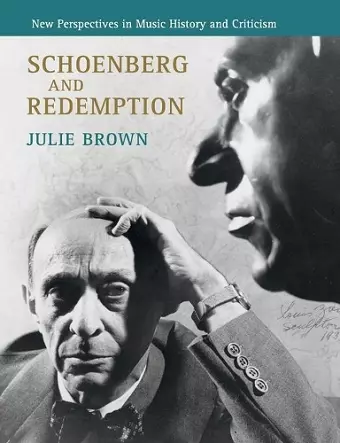Schoenberg and Redemption
Understanding the cultural tensions in Schoenberg's music
Format:Paperback
Publisher:Cambridge University Press
Published:20th Dec '18
Currently unavailable, and unfortunately no date known when it will be back
This paperback is available in another edition too:
- Hardback£90.00(9780521550352)

This book explores Schoenberg's transition to atonality, linking it to Wagner's critiques of Jewish influence in German music, offering new insights into his revolutionary contributions.
In Schoenberg and Redemption, Julie Brown offers a fresh perspective on Arnold Schoenberg's pivotal shift into atonality in 1908. By reexamining his early atonal compositions, theoretical writings, and previously untapped archival materials, she posits that Schoenberg's groundbreaking move was, in part, a reaction to Richard Wagner's negative assertions regarding Jewish influence in German music. This exploration delves into the complexities of Schoenberg's Jewish identity and its interplay with his dedication to Wagnerian modernism, which fueled his artistic innovations during a critical period.
Brown highlights the significant cultural and ideological contexts of late 19th and early 20th century Vienna, drawing connections between Schoenberg's work and the ideas of Viennese philosopher Otto Weininger, an influential figure who shared Wagner's views. By situating Schoenberg's atonal works within this framework, the author sheds light on the broader implications of his music and the motivations behind his radical departure from traditional tonality. This examination also reveals how Schoenberg's ideological stance evolved, particularly during the late 1920s and early 1930s, when the discourse surrounding the redemption of German culture took on new meanings.
Ultimately, Schoenberg and Redemption invites readers to reconsider the motivations behind Schoenberg's revolutionary contributions to music, suggesting that his artistic choices were deeply intertwined with the cultural tensions of his time. Brown's meticulous research and insightful analysis provide a nuanced understanding of Schoenberg's legacy and the enduring impact of his work on the landscape of modern music.
'This book reopens the subject of Jewish culture in the life and work of the twentieth-century classical composer Arnold Schoenberg … [it] draws on the writings of Austrian philosopher Otto Weininger, providing a welcome reintroduction of his work into musicological research. Above all, the author shows a remarkable ability to negotiate the shifting sands of Schoenberg's thought in an authoritative manner, not an easy task … this stimulating book should be available to all who are interested in European culture …' M. Dineen, Choice
'… Schoenberg and Redemption offers important evidence with highly believable postulations … this is an important book that deserves a wide readership …' Michael Haas, Times Literary Supplement
'Julie Brown's Schoenberg and Redemption newly testifies to the power of a composer's self-expressive prose … Bringing to light two previously [understudied] writings of Schoenberg, Julie Brown presents an absorbing view of his turn to atonality … Brown records a history of Schoenberg's modernist invention, and in the process, adds to Wagner's legacy too.' Victoria Aschheim, Notes: Quarterly Journal of the Music Library Association
ISBN: 9781108722070
Dimensions: 245mm x 190mm x 14mm
Weight: 500g
273 pages